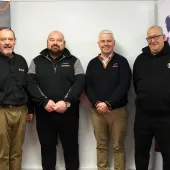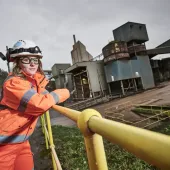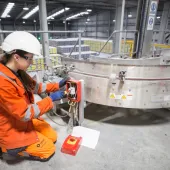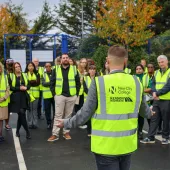IQ Study Tour Delivers on Personal Effectiveness Agenda
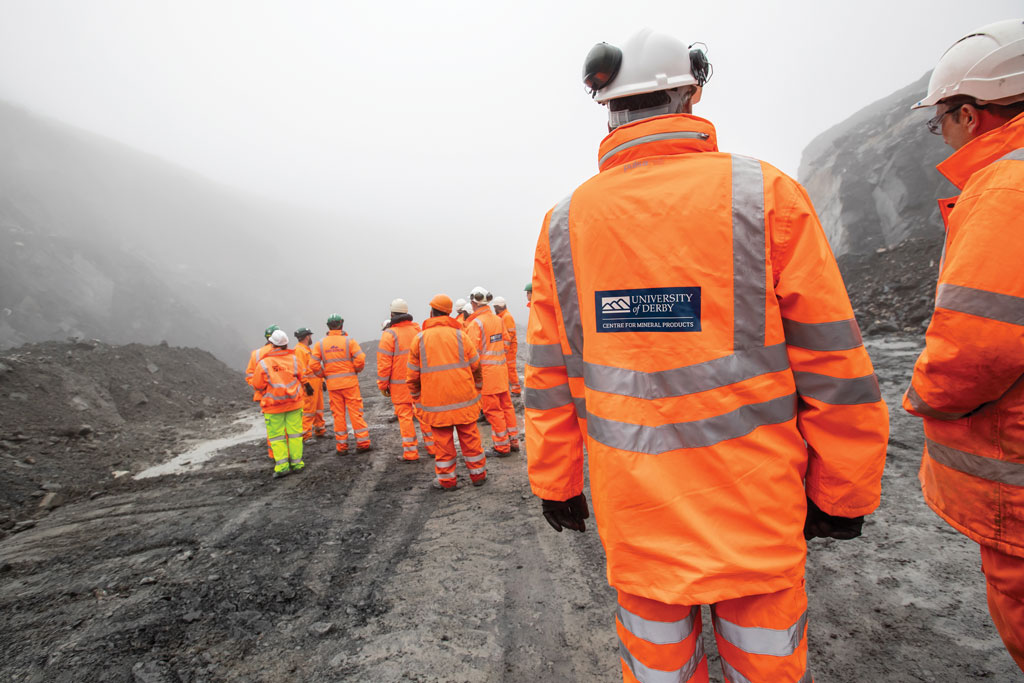
First published in the April 2019 issue of Quarry Management
IQ's latest study tour allows students to see theory being put into practice
There is a lot of talk in business around the subject of personal effectiveness. But what do we mean by the term? And why is it so important? It is a key part of the Institute of Quarrying’s Skills Wheel, a tool that helps identify the full range of competencies for the modern professional working in the mineral extractives and quarrying industries.
Search ‘personal effectiveness’ on Google and you will be bombarded with a plethora of different definitions and providers equipped to deliver professional development programmes. When we speak about personal effectiveness, we mean making use of all the resources you have at your disposal to enable you to master your life and achieve both work and life goals. Applied to the mineral extractives and quarrying industry, it is about being equipped with a range of skills and expertise to be effective beyond the basics of the day-to-day job itself.
Some may question whether personal effectiveness skills are ‘nice to have’ when there are many other priorities that the industry faces. But organizations with highly cohesive teams are more likely to be successful in meeting the tough challenges the industry has to offer. The ability to understand what motivates those around them and be able to engage and communicate with the individuals within their teams is critical for leaders at all levels of an organization.
James Thorne, IQ’s chief executive officer, says: ‘Personal qualities are the characteristics that make people who they are. As well as the knowledge and skills that we all bring to work, your personal qualities define how you go about applying yourself to a specific role or task. Learning how to evaluate your strengths and weaknesses, and being able to use them in the most effective way, is an important part of developing leadership skills.
‘Leadership means different things to different people but without trusted, capable leaders at all levels in an organization, businesses will often struggle to achieve long-term growth ambitions.
‘Successful professionals within the quarrying and mineral extractives industry are aware of their own personal attributes and how to use them effectively. Understanding your own and others’ personality traits can help with problem solving, team building, improving communication and will ultimately assist in delivering positive outcomes for individuals, teams and the organization.’
Study tour
Developing personal effectiveness skills outside the work environment is one of the goals of IQ’s study tour for degree and diploma-level students from the University of Derby’s Centre for Mineral Products. The study tour is an opportunity for students to see theory being put into practice.
Dr Rob Donnelly, senior lecturer in mineral products at the University of Derby Centre for Mineral Products and joint co-ordinator of the tour with IQ, explains: ‘On all of the courses that the Centre for Mineral Products provides, students learn the technical theories and practices that mineral products industries apply. At the same time students are developing critical thinking and presentation skills that help them in preparing for future leadership and management roles.’
This year’s study tour included attendees from The Icelandic Road & Coastal Administration and Uganda National Roads Authority, as well as Tarmac, Brett Aggregates Ltd, Tynedale Roadstone Ltd and Aggregate Industries.
The week-long programme explored a number of different mineral extraction and processing sites located across the north-west of England. Featured sites included Hanson Aggregates’ Shap Quarry and Tarmac’s Dry Rigg, Arcow and Swinden quarries, as well as Tata Steel’s Shapfell lime operations, Hanson’s Ribblesdale cement works and Forterra’s Claughton brickworks.
William Slack is an asphalt laboratory technician at Tynedale Roadstone, part of MGL Group Ltd. A previous attendee of IQ’s study tours, he is currently studying for his Bachelor of Science (BSc) Honours Degree in Mineral Management at the University of Derby’s Centre for Mineral Products. He says: ‘It’s my third tour and it’s really good. I’m on the course to learn more about the management side of the business and the study tour is a unique opportunity to get out and about, seeing how different companies and operations work. Then there’s the chance to meet new people and learn from them, which is so valuable.’
Pete Atwal, production manager for West Anglia at Tarmac, is also studying the Honours Degree in Mineral Management and has returned for his fourth study tour. He says: ‘It’s very good because it takes you out of your comfort zone and your current working climate to see parts of the industry you wouldn’t normally see. I’m from a sand and gravel area so to see hard rock environments and be given such an in-depth view by the local site teams – plus having the chance to ask questions – is very valuable.
‘There is also the networking aspect of the tour. We’re all part of the same industry and it’s really helpful to meet people from other companies, doing the same job as you and looking at what challenges they face. On the tour you visit large, well-run and well-managed operations and it’s interesting to see the different challenges that they face. You realize in this industry it’s not one model fits all and it’s an eye-opener to see what happens elsewhere.’
This year the study tour was also able to join IQ members at the IQ Lancashire branch meeting and an evening presentation by HSE Inspector Mike Tetley.
James Thorne concludes: ‘It was great to be able to combine the benefits of the study tour with the benefit of meeting members at the IQ Lancashire CPD day. For everyone it was a great opportunity to share experiences and learn from each other, and that’s important for personal and professional growth.’
- Subscribe to Quarry Management, the monthly journal for the mineral products industry, to read articles before they appear on Agg-Net.com


